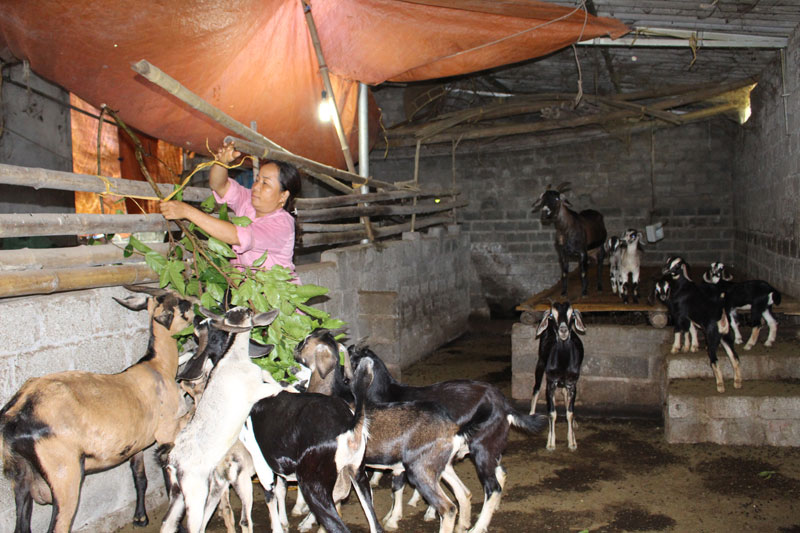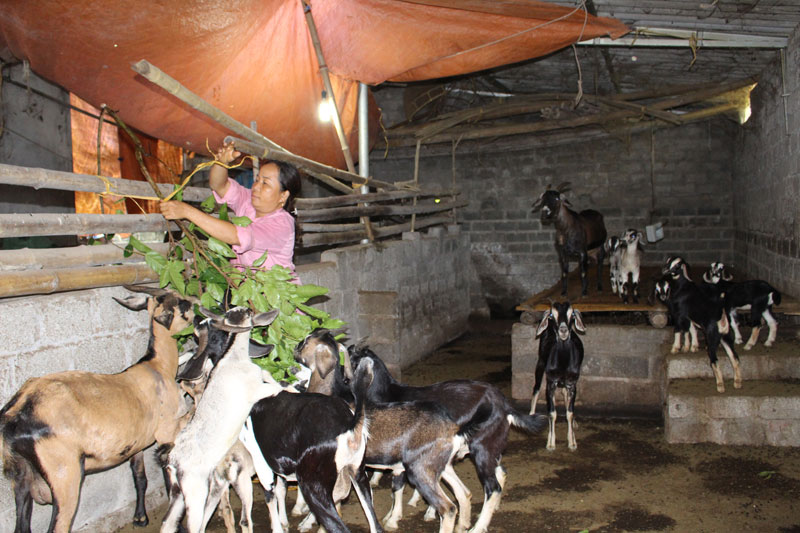
HBO – Through studying, people in Cao Duong commune (Luong Son district) recognized that the local climate and terrain are suitable for goat farming. Thus, a goat farming model has been implemented and expanded by locals. Goat farming brings in stable economic efficiency, helping many households escape from poverty.
Goat herb of Bui ThiHien’s family in
QuenThi village
At present,
Cao Duong commune is home to about 106 goat raising households with a total of
nearly 1,300 head. The breeders are seen in all villages but mostly in QuenThi
village, with 15 households. Among well-known goat breeders are Ha Van Dan and
Bui DinhChien in QuenThi village, Nguyen Van Tai and Bach Van Thin in Om Lang
village.
Bui DinhChien (QuenThi village) said that goat breeders must pay attention to
the animal’s characteristics. As goats like dryness and tidiness, their shelters
should be built in high, dry and cool places. Breeders must apply scientific
and technological advances in all stages, from shelter making to supervision
and management of goat herbs. To have healthy goat herbs, the first thing is to
select good breeding animals and clean up shelters regularly. Especially, feed
for goats must be kept dry to prevent themfrom getting stomachache. Goats have
high resistance so breeders only need to regularly worm and vaccinate them
against communicable diseases.
The goat consumption market is relatively stable. In some times, many
households had no goats for sale due to huge demand. With
the application of caring techniques and grasping of market demand, goat
farming is bringing in high economic efficiency, contributing to improving
living conditions of people in Cao Duong commune.
Bui Minh Bien, Chairman of the communal People’s Committee, said that to
develop and expand the goat farming, the committee has organised training
courses on a model toimprove local goat herbs using capital sources from the
agro-forestry promotion agency of Luong Son district. The commune implementsa policy
that the State pays 80 percent of money for purchasingmale goats while the
remaining 20 percent is covered by the breeder. In addition, it has also held
training courses on goat farming techniques, attracting more than 200 participants./.
According to data from the Hoa Binh Provincial Party Committee, the industrial production index for the first six months of 2025 is estimated to have increased by 20% compared to the same period last year. This marks the highest year-on-year growth rate for this period since 2020.
In the first six months of 2025, Hoa Binh province’s export turnover was estimated at 1.145 billion USD, marking an 18.11% increase compared to the same period in 2024. Import turnover was estimated at $ 804 million, a 17.15% increase, which helped the province maintain a positive trade balance.
The lives of the ethnic minority farmers in Tan Lac district have gradually improved thanks to the new directions in agricultural production. This is a testament to the collective strength fostered through the professional associations and groups implemented by various levels of the district’s Farmers’ Union.
With the motto the "product quality comes first,” after nearly one year of establishment and operation, Muong village’s Clean Food Agricultural and Commercial Cooperative, located in Cau Hamlet, Hung Son Commune (Kim Boi district), has launched reputable, high-quality agricultural products to the market that are well-received by consumers. The products such as Muong village’s pork sausage, salt-cured chicken, and salt-cured pork hocks have gradually carved out a place in the market and they are on the path to obtaining the OCOP certification.
In the past, the phrase "bumper harvest, rock-bottom prices" was a familiar refrain for Vietnamese farmers engaged in fragmented, small-scale agriculture. But today, a new spirit is emerging across rural areas of Hoa Binh province - one of collaboration, organisation, and collective economic models that provide a stable foundation for production.
Maintaining growing area codes and packing facility codes in accordance with regulations is a mandatory requirement for agricultural products to be eligible for export. Recently, the Department of Agriculture and Environment of Hoa Binh province has intensified technical supervision of designated farming areas and packing facilities to safeguard the "green passport" that enables its products to access international markets.



